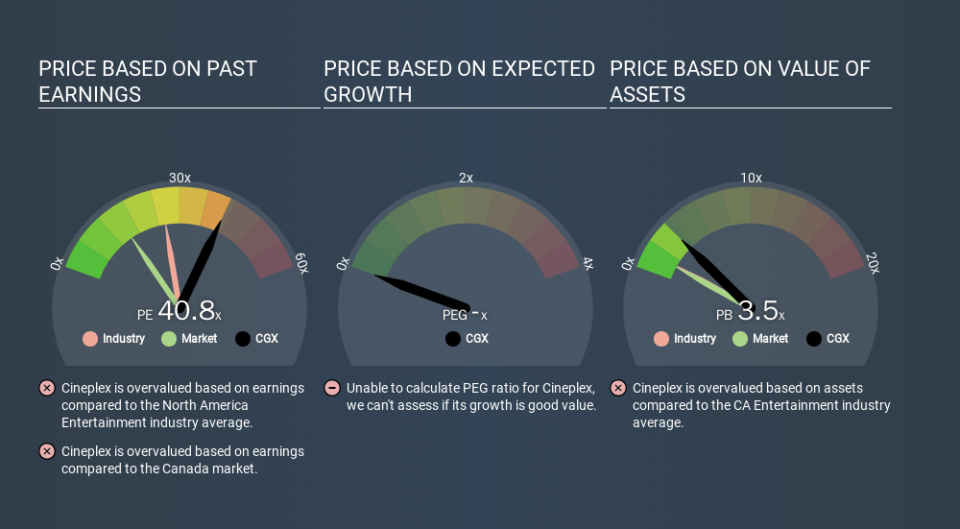How Does Cineplex's (TSE:CGX) P/E Compare To Its Industry, After Its Big Share Price Gain?

Cineplex (TSE:CGX) shares have had a really impressive month, gaining 40%, after some slippage. The full year gain of 35% is pretty reasonable, too.
All else being equal, a sharp share price increase should make a stock less attractive to potential investors. While the market sentiment towards a stock is very changeable, in the long run, the share price will tend to move in the same direction as earnings per share. The implication here is that deep value investors might steer clear when expectations of a company are too high. Perhaps the simplest way to get a read on investors' expectations of a business is to look at its Price to Earnings Ratio (PE Ratio). A high P/E ratio means that investors have a high expectation about future growth, while a low P/E ratio means they have low expectations about future growth.
Check out our latest analysis for Cineplex
How Does Cineplex's P/E Ratio Compare To Its Peers?
We can tell from its P/E ratio of 40.84 that there is some investor optimism about Cineplex. The image below shows that Cineplex has a higher P/E than the average (26.1) P/E for companies in the entertainment industry.
That means that the market expects Cineplex will outperform other companies in its industry. Shareholders are clearly optimistic, but the future is always uncertain. So further research is always essential. I often monitor director buying and selling.
How Growth Rates Impact P/E Ratios
When earnings fall, the 'E' decreases, over time. That means unless the share price falls, the P/E will increase in a few years. Then, a higher P/E might scare off shareholders, pushing the share price down.
Cineplex shrunk earnings per share by 38% over the last year. And over the longer term (5 years) earnings per share have decreased 4.1% annually. This growth rate might warrant a below average P/E ratio.
A Limitation: P/E Ratios Ignore Debt and Cash In The Bank
It's important to note that the P/E ratio considers the market capitalization, not the enterprise value. That means it doesn't take debt or cash into account. The exact same company would hypothetically deserve a higher P/E ratio if it had a strong balance sheet, than if it had a weak one with lots of debt, because a cashed up company can spend on growth.
Such expenditure might be good or bad, in the long term, but the point here is that the balance sheet is not reflected by this ratio.
How Does Cineplex's Debt Impact Its P/E Ratio?
Cineplex has net debt equal to 30% of its market cap. You'd want to be aware of this fact, but it doesn't bother us.
The Verdict On Cineplex's P/E Ratio
Cineplex has a P/E of 40.8. That's higher than the average in its market, which is 15.4. With some debt but no EPS growth last year, the market has high expectations of future profits. What is very clear is that the market has become significantly more optimistic about Cineplex over the last month, with the P/E ratio rising from 29.1 back then to 40.8 today. If you like to buy stocks that have recently impressed the market, then this one might be a candidate; but if you prefer to invest when there is 'blood in the streets', then you may feel the opportunity has passed.
Investors should be looking to buy stocks that the market is wrong about. As value investor Benjamin Graham famously said, 'In the short run, the market is a voting machine but in the long run, it is a weighing machine. So this free report on the analyst consensus forecasts could help you make a master move on this stock.
You might be able to find a better buy than Cineplex. If you want a selection of possible winners, check out this free list of interesting companies that trade on a P/E below 20 (but have proven they can grow earnings).
If you spot an error that warrants correction, please contact the editor at editorial-team@simplywallst.com. This article by Simply Wall St is general in nature. It does not constitute a recommendation to buy or sell any stock, and does not take account of your objectives, or your financial situation. Simply Wall St has no position in the stocks mentioned.
We aim to bring you long-term focused research analysis driven by fundamental data. Note that our analysis may not factor in the latest price-sensitive company announcements or qualitative material. Thank you for reading.

